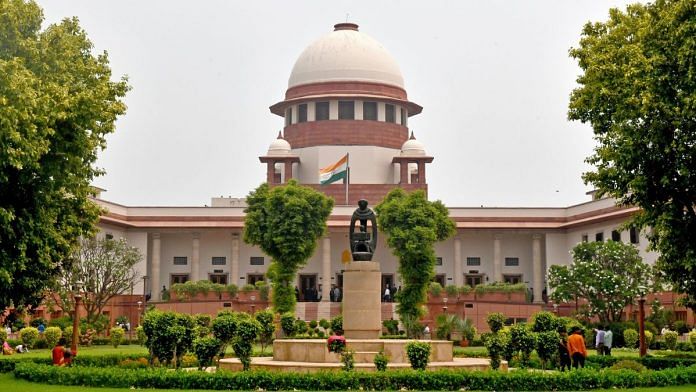New Delhi: Can Parliament amend the Constitution to take administrative services out of the control of the Delhi government? This question became the focal point of deliberations in the Supreme Court Monday.
A three-judge bench, led by Chief Justice D.Y. Chandrachud, raised the issue while hearing the Delhi government’s petition against a central government ordinance that overturned the former’s control over administrative services in the Capital. It also mulled over whether the question should be referred to a Constitution bench.
The Government of National Capital Territory of Delhi (Amendment) Ordinance, 2023, came on 19 May, days after a Supreme Court ruling granted the Delhi government legislative and executive powers over administrative services in Delhi.
The ordinance creates a three-member authority — headed by the Delhi chief minister, with two central-government-appointed officers, Delhi chief secretary and principal secretary, home department, as members — for government postings, including civil servants.
The legislation, which will need Parliament’s ratification, gives the lieutenant governor (L-G) the deciding power in case of a deadlock. Of particular significance is Section 45D, which gives the L-G “overriding powers” regarding the formation of and appointments to commissions established through central acts.
“There are three entries over which the Delhi government has no control. What they (central government) have done is that by using the power under (Article) 239AA they have amended the Constitution to take services out of Delhi government control. Is that permissible?” the bench, also comprising justices P.S. Narasimha and Manoj Mishra, said.
Article 239AA of the Indian Constitution deals with special provisions for Delhi — specifically, it’s a provision that alters the legal status of Delhi from a Union Territory to a quasi-state. Under the Constitution, state civil services come under the purview of the state list.
According to the judges, neither the court’s 2018 judgment nor the 2023 ruling on distribution of powers in the Capital covered this question of law. While the 2018 judgment ruled that Delhi’s L-G was mandated to act on the aid and advice of the elected government, the 2023 ruling held that although the Union government has exclusive control over law and order, police and land, it’s the Delhi’s elected government that has administrative and legislative control over its services.
Since the ordinance was passed, Delhi’s Aam Aadmi Party (AAP) government under Chief Minister Arvind Kejriwal has been accusing the Modi government of violating the rules of federalism and democratic governance.
What happened at the hearing
On Monday, the Supreme Court also sought to inquire into the overriding powers the ordinance assigns to the L-G.
Chief Justice Chandrachud said at the hearing that while Parliament has the power to enact law under any entry in List I (the Union List) and List III (the Concurrent List, which has topics on which both central and state governments can legislate) of the Constitution, the state assembly has the power to legislate over List II (State list).
“(But) you have said by Clause 3 of the ordinance that the state legislature cannot enact law under Entry 41 (which deals with state public services) of List II,” the CJI said.
The court’s suggestion of a reference to a higher bench evoked mixed responses — while senior advocate Abhishek Manu Singhvi, who was appearing for the Delhi government, opposed it, senior advocate Harish Salve, who was appearing for the lieutenant governor, was in its favour.
Singhvi urged the bench to hear him Thursday.
On his part, Solicitor General Tushar Mehta, who was representing the Union government, sought to clarify that according to Article 239AA(7)(b) of the Constitution, any changes under the preceding provision — Article 239AA(7)(a) — is not deemed as an amendment.
What Mehta meant is that when the ordinance is placed before the Parliament, it would become a bill, cementing the changes the former intends to bring to the existing framework of the Constitution vis-à-vis the Delhi government’s jurisdiction on “services”. However, the changes would technically not be construed as amendment under Article 239AA(7)(b).
Mehta further said that the ordinance would be tabled in the Lok Sabha in the forthcoming Monsoon session but that it could be in a different form.
“It is possible that the ordinance may be passed in a different form. I am not aware if 45D will go before Parliament in this form,” Mehta told the bench. He asked the court to defer the hearing, saying that “no prejudice is being caused to anyone” and that the “court may wait (for the outcome in Parliament).”
The Monsoon session of Parliament will begin Thursday.
Meanwhile, the court also intervened in an ongoing tussle between Delhi’s AAP government and L-G V.K. Saxena over appointing the head of Delhi Electricity Regulatory Commission (DERC). While Saxena had appointed former Allahabad High Court judge Justice Umesh Kumar as the head of Delhi’s electricity regulator on 21 June, the Kejriwal government challenged it on the ground that it was done without consultation.
“The two constitutional functionaries have to rise above the political bickering and should give a name for the DERC chairperson,” the bench observed, asking the two “constitutional functionaries” to sit down and get to governance.
“DERC chairperson is not the issue, but that you both can sit together and sort out some issues,” the bench said, saying it will hear both cases on 20 July.
This is an updated version of the report
(Edited by Uttara Ramaswamy)



